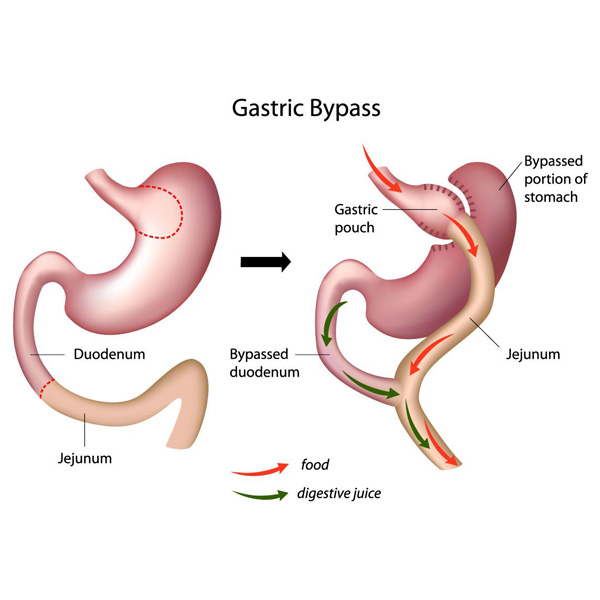Gastric Mini Bypass Surgery
Gastric Mini Bypass Surgery
In Gastric Mini Bypass surgery, the small intestine is not cut. In this procedure, the shrunken stomach is connected to a 150 to 200 cm narrow intestine.
Gastric mini-bypass surgery is a type of slimming surgery that is a combination of gastric sleeve and gastric bypass surgery. In general, weight loss is done with a mini-gastric bypass. Unlike classic bypass, this surgery connects the small intestine and stomach with just one anastomosis (a small stomach 150 to 200 cm from the small intestine). For this reason, gastric mini-bypass surgery is also known as single-pass anastomosis. This new method of bypass has fewer side effects than the old method, but bile reflux is more likely in this method, which, if annoying, should be converted to the conventional classical bypass method.

What is the difference between gastric bypass and gastric bypass?
In mini-surgery, there is only one anastomosis (the point where the stomach connects to the small intestine), but in a normal bypass, there will be two anastomoses (the point of connection of the stomach to the small intestine and the point of connection of part of the small intestine to itself). For people who suffer from obesity, losing weight works best because the absorption in the mini-bypass is much more significant than in the normal bypass. Also, the volume of the stomach bag in mini-bypass surgery will be more than by bypass surgery. This greatly reduces the possibility of surgical problems and complications.
Who is gastric bypass surgery suitable for?
Indication of obesity surgery as the best, most definitive and most effective methods of treating obesity in patients with obesity and its complications such as diabetes, sleep apnea, fatty liver, etc. with BMI> 30 is the best choice and in patients without obesity Complications with BMI> 32.5 will be candidates for obesity surgery. It should be noted that the type of operation has nothing to do with BMI and determines the type of operation depending on working conditions, family, eating habits and daily life, and the results of experiments and endoscopy.
– People who have experienced different diets many times but unfortunately have not been able to lose weight to their ideal weight and have returned to a much higher weight after the end of the course of treatment.
– In people who are sweet lovers (excessive sweets) who do not use gastric restriction methods or in people who have been bandaged but lose weight due to sweets, the patient has failed or stopped, this is the best treatment Is an alternative.
– The presence of gastroesophageal reflux disease in obese obese patients or people who have previously been bandaged and now have complications of esophageal dilatation and reflux, requires that the gastric bypass technique be selected for the patient.
– Patients who live abroad or have been away from home for a long time and are not able to adjust the ring or frequent visits to the surgeon, are good candidates for this operation.
– In diabetic patients, gastric bypass surgery has improved by 93% to 90% and has reduced mortality from this disease.
– In gastric bypass surgery, weight loss occurs faster than other cases.
– Significant side effects, such as gastroesophageal reflux disease, staphylococcal ulcers, type II hyperlipidemia, and hypertension, improve by 70 to 90 percent.
Advantages of Mini Bypass Surgery
One of the important advantages of mini-bypass surgery can be performed through laparoscopy, so the length of the operation in this method is short and is very suitable for patients who suffer from obesity and do not tolerate prolonged anesthesia. This operation is as classic as the bypass operation and sometimes more. Side effects during this procedure are much less, and even in this method, surgery better treats type 2 diabetes. Also, in this type of operation, it can become a classic bypass operation or even return to its original state.

Disadvantages of gastric mini-bypass surgery
One of the main and most important disadvantages of this method is the entry of bile into the stomach and possibly into the esophagus. This chronic reflux can increase with the possibility of menstrual irregularities and can last for more than 30 years. For this reason, the risk of this procedure has not been officially confirmed by the United States. This intestinal malabsorption can also lead to diarrhea, anemia, and iron deficiency.

